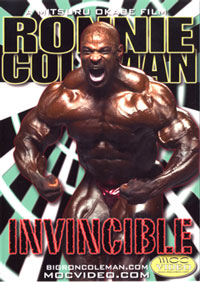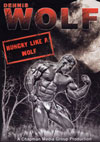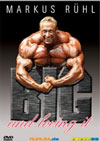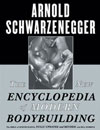Bodybuilding DVD's
Ronnie Coleman

Colossal Workout
Dennis Wolf

Dorian Yates

Believe to Achieve
Jay Cutler's house

Hard and Heavy







|
Hybrid Hypertrophy bodybuilding strength training
by Chad Waterbury
Torching the Burnout Method
One method that�s always resurfacing in various forms in the field of
hypertrophy training is the "burnout method." Excluding the awful name, a few
trainees have found it somewhat useful in packing on a little muscle. It
basically consists of performing an exercise with pseudo-maximal strength
parameters, followed by a sub-maximal set taken to failure. It�s reared its head
in many forms, but one of the better known methods is this:
Exercise: Squats (for example)
Sets: 5
Reps: 10, 8, 6, 4, 2
Load: 10 Reps Max, 8RM, 6RM, 4RM, 2RM
Followed by:
Exercise: Squats
Sets: 1
Reps: 18-20 (taken to failure)
Load: 18-20RM
To summarize, the first five sets consist of increasing loads and decreasing
reps in an effort to recruit the high-threshold fast-fatigable (FF) motor units.
Once maximal strength has been "primed," one last set with a sub-maximal (~60%
of 1RM) is taken to failure.
Not a bad idea, but it definitely has its shortcomings:
Shortcoming #1 ďż˝ Failure training. Bad, bad and more bad. Sending your kids to
play with Michael Jackson bad. Training to failure is so outdated that I can�t
even bear to discuss it. Failure training induces excessive CNS fatigue.
Successful training (of any sort) revolves around fatigue management. Therefore,
any method that induces excessive fatigue should be avoided.
Bottom Line: The burnout method revolves around taking the last set to absolute
failure and this should be avoided in order to keep the nervous system as fresh
as possible.
Shortcoming #2 ďż˝ Excessive Parameters. If you try to accomplish everything in
one session, you�re going to be in trouble, and overtraining will be right
around the corner. If you focus on increasing one or two strength qualities
during a single session, you�ll be much better off.
Bottom Line: Excessive sets + Excessive rep ranges + Muscular failure = Shitty
results.
Shortcoming #3 � Inferior Maximal Strength Gains. I don�t care if you have no
desire to ever step foot inside a powerlifting or Olympic lifting circle, you
must be cognizant of maximal strength training if you want to become massive and
massively strong.
Bottom Line: The burnout method leads to sub par strength gains which, in turn,
wreak havoc on your hypertrophy efforts since the recruitment of the massive FF
motor units are only emphasized in the middle portion of the workout.
Shortcomings #1 and #2 are relatively easy to resolve. Regarding failure
training, the only modification that needs to be made is to stop one rep short
of failure. Simple enough.
Shortcoming #2 (excessive parameters) can also be fixed. You could merely
replace the inverse set/rep relationship with more constant parameters such as 3
x 3 or 5 x 5. But the biggest shortcoming of all (inferior maximal strength
gains) hasn�t been addressed � until now.
One of the most interesting observations I�ve made within the realms of iron
apparatuses is that the nervous system best "remembers" the last set. It�s akin
to listening to a three-hour seminar: you usually only remember the end points.
The same appears to be true with weight training.
Therefore, the traditional burnout method leaves your nervous system remembering
a light load that primarily taxed the fast fatigue-resistant (FFR) motor units.
This is bad news if it�s done week in and week out because you�ll lose your
maximal strength levels in no time.
But wait, you don�t care about maximal strength, you only care about muscle mass
increases, right? Please refer back to my "bottom line" statement in the
aforementioned point #3 before I track you down and choke you out!
The Solution
I�ve found a better way. If you incorporate the following method into your next
hypertrophy phase, you�ll be bigger and stronger than ever. This method is based
on three important principles:
1) Avoiding absolute muscular failure.
2) Maintaining relatively constant parameters that don�t confuse the hell out of
your nervous system.
3) Achieving greater maximal strength increases.
Here�s how it works. To begin, you�ll perform the first compound exercise for
3-4 sets until you reach a 3RM for that lift. Remember, a 3RM represents a load
you could lift for three perfect reps without losing form. If you must
compromise form to reach the third rep, decrease the load 2.5% and try again.
Second, you�ll pick a different exercise for the same muscle group and perform
12-14 reps while stopping one rep short of muscular failure.
Lastly, you�ll perform one set of 2-3 reps with the same compound exercise that
you start with. Oftentimes, you won�t be able to perform all three reps with the
same load you started with, but you should be able to perform at least two reps.
This will effectively re-recruit the FF motor units so you won�t leave the CNS
remembering a light load.
Keep in mind, this isn't a "pure" maximal strength program; this is a
hypertrophy-based program that also causes maximal strength gains.
The Program
I titled this program "Hybrid Hypertrophy" since it combines a few different
methods into the same session. Up to this point, most of my programs revolved
around training a single strength quality within each session. Since this
program combines a few methods into each workout, you�ll be able to perform it
for up to four weeks before switching programs. (Some of my clients have
performed this program for as long as six weeks without losing the effect, but
stick to four weeks as a starting point.)
Note: Please do everything in your power to adhere to the following exercises. I
tried to choose exercises that are virtually ubiquitous to every gym, whether it
be commercial or home. Each day consists of specific exercises that I�ve found
most useful.
DAY 1
Exercise: Close-Grip Bench Presses
Sets: 3
Reps: 3
Loads: 6RM, 5RM, 3RM
Rest: 60 seconds between sets
Rest 60 seconds and perform:
Exercise: Barbell Skull Crushers
Sets: 1
Reps: 12-14
Load: 14RM
Rest 180 seconds and perform:
Exercise: Close-Grip Bench Presses
Sets: 1
Reps: 2-3
Load: 3RM
Exercise: Deadlifts
Sets: 3
Reps: 3
Loads: 6RM, 5RM, 3RM
Rest: 75 seconds between sets
Note: Shoulder-width stance, non-mixed grip. Keep your torso as vertical as
possible.
Rest 75 seconds and perform:
Exercise: Front Squats
Sets: 1
Reps: 12-14
Load: 14RM
Rest 180 seconds and perform:
Exercise: Deadlifts
Sets: 1
Reps: 2-3
Load: 3RM
Note: Shoulder-width stance, non-mixed grip. Keep your torso as vertical as
possible.
Exercise: Chin-ups
Sets: 3
Reps: 3
Loads: 6RM, 5RM, 3RM
Rest: 75 seconds between sets
Note: Use a palms-up, wider than shoulder width grip.
Rest 75 seconds and perform:
Exercise: Decline Bench Dumbbell Pullovers or Straight Arm Cable Pulldowns
Sets: 1
Reps: 12-14
Load: 14RM
Rest 180 seconds and perform:
Exercise: Chin-ups
Sets: 1
Reps: 2-3
Load: 3RM
Note: Use a palms-up, wider than shoulder width grip.
DAY 2
OFF. Perform 15-20 minutes of jogging, uphill walking (for calf development), or
GPP work.
DAY 3
Exercise: Power Cleans
Sets: 3
Reps: 3
Loads: 6RM, 5RM, 3RM
Rest: 75 seconds between sets
Rest 75 seconds and perform:
Exercise: Barbell Back Squats
Sets: 1
Reps: 12-14
Load: 14RM
Rest 240 seconds and perform:
Exercise: Power Cleans
Sets: 1
Reps: 2-3
Load: 3RM
The Power Clean
Exercise: Decline Sit-ups or Flat Sit-ups w/Feet Hooked
Sets: 3
Reps: 3
Loads: 6RM, 5RM, 3RM
Rest: 60 seconds between sets
Note: Hold a dumbbell at your chest for added resistance.
Rest 60 seconds and perform:
Exercise: Cable Crunches or Swiss Ball Crunches
Sets: 1
Reps: 12-14
Load: 14RM
The Cable Crunch
Rest 180 seconds and perform:
Exercise: Decline Sit-ups or Flat Sit-ups w/Feet Hooked
Sets: 1
Reps: 2-3
Load: 3RM
Note: Hold a dumbbell for added resistance.
Exercise: 45 Degree Incline Dumbbell or Barbell Bench Press
Sets: 3
Reps: 3
Loads: 6RM, 5RM, 3RM
Rest: 60 seconds between sets
Rest 60 seconds and perform:
Exercise: Standing Dumbbell Military Press
Sets: 1
Reps: 12-14
Load: 14RM
Note: Keep your palms facing each other throughout movement.
Rest 180 seconds and perform:
Exercise: 45 degree Incline Dumbbell or Barbell Bench Press
Sets: 1
Reps: 2-3
Load: 3RM
DAY 4
OFF. Perform 15-20 minutes of jogging, uphill walking or GPP work
DAY 5
Exercise: Dips
Sets: 3
Reps: 3
Loads: 6RM, 5RM, 3RM
Rest: 60 seconds between sets
Rest 60 seconds and perform:
Exercise: French Presses
Sets: 1
Reps: 12-14
Load: 14RM
Note: Perform with an EZ-Curl bar, if available. If not, use a barbell or use
dumbbells and keep your palms facing each other.
Books and Courses
|
Great Websites
|
Excellent Stores
|
Recipe Cook Books
|
|
|



